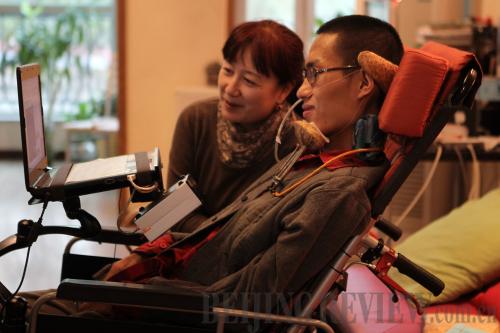|
 |
|
ON THE GO: Miao Guwei enjoys the outdoors in Luoyang, central China's Henan Province, with help from his mother Gu Xiuying and a specialized motor scooter (ZHANG XIAOLI) |
Although a 20-something, Miao Guwei lives like a baby. Every morning when he wakes up, he lies in bed quietly, waiting for his mother to pick him up, dress him, wash his face and then carry him around on her back.
For more than a decade, Miao has lived with a disease called amyotrophic lateral sclerosis (ALS), which has been encroaching on his nerve cells and progressively paralyzing him. Now, he can no longer stand, walk or move his arms freely.
As a prevalent form of motor neuron disease, it is commonly referred to as such in Britain, while in the United States it is better known as Lou Gehrig's disease.
Miao grew up in a small town in Han'an County, east China's Jiangsu Province. When he was a young boy, he was normal, but not very athletic.
"A teacher said that my son has such poise that he must be a high achiever in the future," said Miao's mother Gu Xiuying. Miao's parents were happy to hear that, and like any parents, they hankered for a bright future for their son.
The first signs of trouble came when Miao was 7 years old. His legs became weak and he often stumbled. In the beginning, his parents suspected calcium deficiency. They brought him to see a doctor anyway.
But doctors' diagnosis struck Miao's parents like a bolt of lightning. The child was diagnosed with ALS. Doctors warned them that the boy would gradually lose his motor skills. Usually, children with the disease would be paralyzed at 12 years old, and die at 20 from respiratory infection or heart failure.
Gu refused to believe that her lovely son would gradually wither and die. She and her husband sought for a cure to the incurable illness, but the disease progressed as doctors predicted. When Miao was 13, he could no longer stand up. Since then, he has been getting around on his mother's back or a specialized motor scooter.
 |
|
VOLUNTEER DESIGNER: Wang Jia, a wheelchair-bound ALS patient in Beijing, operates a computer with just his eyes and right index finger. Wang designs logos for charitable organizations (WU JIANG) |
Along with cancer and AIDS, ALS is one of the five major incurable diseases recognized by the World Health Organization. However, it is still not widely understood. If not for famous sufferers of the disease such as American baseball player Lou Gehrig and British physicist Stephen Hawking, it might be known to even fewer people.
"The disease has an incidence of four out of 100,000, and mostly occurs to those above 40 years old, and so it is inferred that China has about 200,000 ALS suffers," said Cui Liying, Director of the Neurology Department of Peking Union Medical College Hospital in Beijing.
According to doctors, eventually patients will become unable to voluntarily chew, swallow, speak or breathe without ventilatory support. The disease usually does not impair a person's mental, sensory, or involuntary motor capabilities. So far, the causes of the disease are still unknown, although about 5 to 10 percent of all ALS cases are found to be inherited.
Life under ice
Yang Dongping, formerly a computer teacher in a tourism school in Kunming in southwestern Yunnan Province, knew nothing about the disease when, on a summer day in 1998, his once dexterous hand suddenly became too awkward to hold a piece of chalk.
Yang first thought that he was only suffering from exhaustion. But then doctors in two hospitals diagnosed him with motor neuron disease. With no family history of the disease, Yang had no idea what it was.
A trip to the bookstore prophesied his doom. He learned that no medicine can stop the disease's progression to paralysis, and death usually comes within three to five years.
"The diagnosis was like a death sentence, entrapping me in deep horror and worry," Yang wrote in his blog.
| 